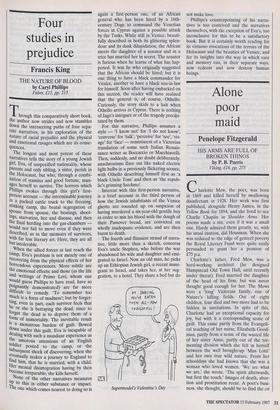Four studies in prejudice
Francis King
THE NATURE OF BLOOD by Caryl Phillips Faber, £15, pp. 213 Through this comparatively short book, the author now strides and now stumbles down the intersecting paths of four sepa- rate narratives, in his exploration of the nature of racial prejudice and the physical and emotional ravages which are its conse- quences.
The longest and most potent of these narratives tells the story of a young Jewish girl, Eva, of unspecified nationality, whose parents and only sibling, a sister, perish in the Holocaust, but who, through a combi- nation of stamina and good fortune, man- ages herself to survive. The horrors which Phillips evokes through this girl's first- person account — the interminable journey In a packed cattle truck to the freezing, stinking camp, the brutal segregation of spouse from spouse, the beatings, shoot- ings, starvation, lice and disease, and then the final herding into the gas-chambers would not fail to move even if they were described, as in the memoirs of survivors, with far less literary art. Here, they are all but intolerable. When the allied forces at last reach the camp, Eva's problem is not merely one of recovering from the physical effects of her horrendous experiences. More subtle are the emotional effects; and those (as the life and writings of Primo Levi, whom one would guess Phillips to have read, have so Poignantly demonstrated) are far more difficult to remedy. `To remember too much is a form of madness'; but by forget- ting, even in part, each survivor feels that he or she is betraying the dead, since to forget the dead is to deprive them of a form of immortality. The inevitable result Is a monstrous burden of guilt. Bowed down under this guilt, Eva is incapable of dealing with such a mundane experience as the amorous attentions of an English soldier posted to the camp, or the subsequent shock of discovering, when she eventually makes a journey to England to find him, that he is married, with a child. Her mental disintegration having by then become irreparable, she kills herself. None of the other narratives measures up to this in either substance or impact. The one which comes nearest to doing so is again a first-person one, of an African general who has been hired by a 16th- century Doge to command the Venetian forces in Cyprus against a possible attack by the Turks. While still in Venice, beauti- fully described in both its glittering splen- dour and its dank dilapidation, the African meets the daughter of a senator and in a trice has married her in secret. The senator is furious when he learns of what has hap- pened. It was he who originally suggested that the African should be hired; but it is one thing to have a black commander for Venice, another to have a black son-in-law for himself. Soon after having embarked on this section, the reader will have realised that the general is, of course, Othello. Curiously, the story skids to a halt when Othello arrives in Cyprus. There is nothing of Iago's intrigues or of the tragedy precipi- tated by them.
For this narrative, Phillips assumes a style — 'I know not' for do not know', `converse' for 'talk', 'perceive' for 'see', 'vis- age' for 'face' — reminiscent of a Victorian translation of some such Italian Renais- sance writer as Boccaccio or Macchiavelli. Then, suddenly, and no doubt deliberately, anachronisms flare out like naked electric light bulbs in a previously flickering sconce, with Othello describing himself first as 'a black Uncle Tom' and then as 'the repub- lic's grinning Satchmo'.
Intercut with this first-person narrative, is a brief account in the third person of how the Jewish inhabitants of the Venice ghetto are rounded up on suspicion of having murdered a six-year-old gentile boy in order to mix his blood with the dough of their Passover bread, are convicted on wholly inadequate evidence, and are then burnt to death.
The fourth and flimsiest strand of narra- tive, little more than a sketch, concerns Eva's uncle Stephen, who before the war abandoned his wife and daughter and emi- grated to Israel. Now an old man, he picks up an Ethiopian Jewish girl, a recent immi- grant to Israel, and takes her, at her sug- gestion, to a hotel. They share a bed but do Supermodel's Valentine's Day not make love.
Phillips's counterpointing of his narra- tives is too contrived and the narratives themselves, with the exception of Eva's, too inconclusive for this to be a satisfactory book. But it is certainly worth reading for its virtuoso evocations of the terrors of the Holocaust and the beauties of Venice, and for its insights into the way in which race and memory can, in their separate ways, now redeem and now destroy human beings.


























































 Previous page
Previous page